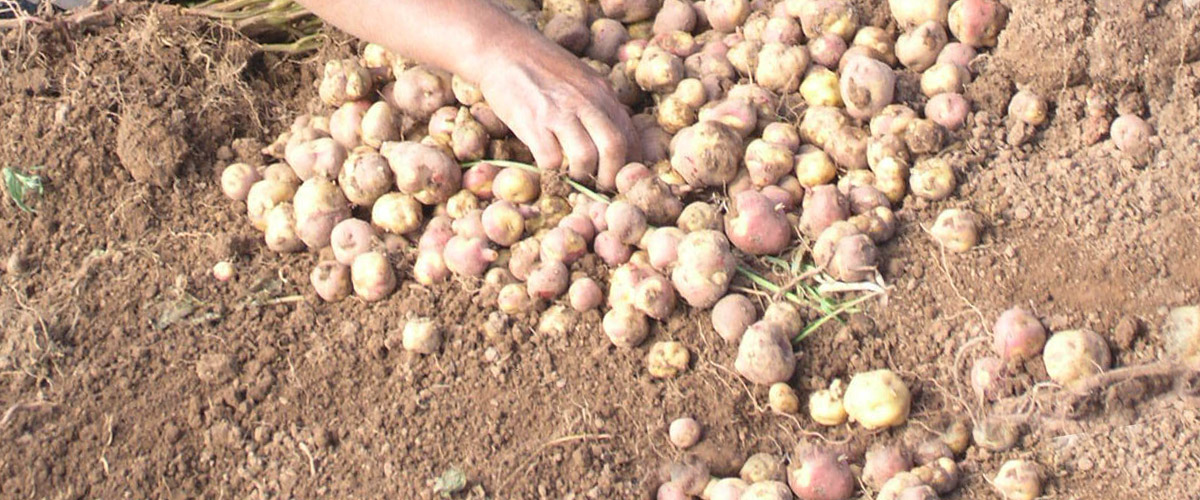
Improving Agrobiodiversity and Seed Systems Research
Lead Organization:
International Potato Center (CIP)
Partner Organizations:
CIP’s Andean Initiative; Andean Agrobiodiversity and Seed System Projects (AASSP); CCRP-Andes regional team and projects Agroecology, Research and Support Methods, Soils, and RHoMIS; Western and East & Southern Africa CoPs; CoPs on Seed Systems and In-Situ Conservation supported by RTB; Wageningen University; University of Florida; and Andean universities such as Universidad Nacional Agraria La Molina, Universidad de Cotopaxi, and Universidad Mayor de San Simon
Community of Practice:
Duration:
8/2021—8/2023
Overview:
Agrobiodiversity and seed systems using agroecologial intensification (AEI) is a CCRP intervention area in the Andes. Projects working on these recognize local knowledge, improve organizational capacity of agrobiodiversity custodians, and unravel linkages between dietary diversity and nutrition through agrobiodiversity.
Existing and new threats—climate change, migration, Covid-19, intergenerational disconnection—may affect agrobiodiversity, disrupt local seed systems, and impact smallholder farmer livelihoods. To strengthen local preparedness and responsiveness, AASSP requires a personalized process of support and backstopping called accompaniment. With limited impact in managing threats, local projects may require larger collective action to perform regional assessments and advocate for policy. The process reflects on each AASSP’s interests and identifies windows of collaboration, identifying areas of synthesis and learning to understand the projects’ contributions. Sharing experiences could inspire, generate discussion, and find potential solutions applicable in other CoPs or the Seed System and In-Situ CoPs supported by the CGIAR Program in Roots, Tubers, and Bananas (RTB).
The McKnight Foundation developed a global theory of change (ToC) for germplasm development, agrobiodiversity, and seed systems. It has never been validated and adapted to AASSP or used to build and inform a research for development (R4D) strategy.
Grant Aims:
1. To accompany AASSP to enhance interventions and add value to project-generated results
The project proposes strengthening each AASSP participant’s capacities based on a diagnostic and supporting projects to add value and publish results in scientific journals, blogs, etc.
2. To dynamize collective action, analysis, and priority-setting
The project proposes strengthening interactions between AASSP and facilitating its interaction with international and Andean universities, CoPs, and networks in other regions.
3. To facilitate the construction of a strategy to strengthen R4D agrobiodiversity and seed system in the Andes
Validate/adapt the general ToC to Andean conditions; identify and document the common goods—shared interests, tools and methods, research questions, areas of synthesis, learnings about work on agrobiodiversity and seed systems—of AASSP; design strategy to strengthen R4D agrobiodiversity and seed systems in the Andes; synthetize and reflect on the collective process for creating R4D strategy.
Outputs and Outcomes:
Outputs
- Review paper summarizing knowledge about unique and common aspects of agrobiodiversity and seed systems in the Andes
- Inventory of capacity building needs, capacities developed, and future capacities to develop
- At least one scientific paper available in an open access repository (e.g., CGSpace) and two blogs written with project support
- At least two datasets published in an open access repository (e.g., Dataverse) and at least one used for decision support
- At least one course about agrobiodiversity and seed systems in the Andes (in Spanish and online or face-to-face, depending on Covid-19)
- At least four workshops/webinars with other CoPs/networks to address common issues and/or knowledge sharing
- Web page within the CCRP-Andes website including a repository for presentations and blogs, dashboard, news, etc. about agrobiodiversity and seed systems R4D in the Andes
- Regional strategy to strengthen R4D agrobiodiversity and seed systems in the Andes, including a ToC validated and adapted to local conditions and inventory of common goods
- Synthesis paper describing the strategy to strengthen R4D agrobiodiversity and seed systems in the Andes and collective actions from AASSP to build it
Outcomes
The following are expected in the medium (more than five years) term:
- AASSP better prepared to respond to existing and new challenges
- AASSP an active CoP, meeting independently and regularly to exchange knowledge and solve problems and attracting funding from investors other than the McKnight Foundation
- Regional and local scientists and extension workers outside of CoP using methodologies and knowledge co-identified/-created with project support to strengthen agrobiodiversity and local seed systems in the Andes and other regions
- Scientists from Andean universities and practitioners using new knowledge generated by the CoP to define new hypotheses, research questions, and interventions relevant to agrobiodiversity and local seed systems in the Andes
- Policy and decision makers using information generated by the CoP to design better regulations, interventions, training programs, and monitoring systems to strengthen agrobiodiversity and seed systems
- Strategy to strengthen R4D agrobiodiversity and seed systems in the Andes revised by other stakeholders in the region, including scientists from local universities, farmers, and grassroots organizations, who join efforts to reach its goals